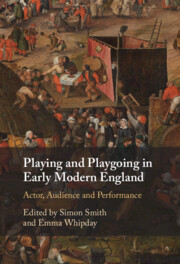Book contents
- Playing and Playgoing in Early Modern England
- Playing and Playgoing in Early Modern England
- Copyright page
- Contents
- Illustrations
- Notes on Contributors
- Acknowledgements
- A Note on the Text
- Introduction
- Part I Players
- Part II Playgoers
- Chapter 5 Playgoing, Apprenticeship, and Profit: Francis Quicksilver, Goldsmith, and Richard Meighen, Stationer
- Chapter 6 Rethinking Early Modern Playgoing, Pleasure, and Judgement
- Chapter 7 ‘Art Hath an Enemie Cal’d Ignorance’: The Prodigal Industry of Early Modern Playwrighting
- Chapter 8 Early Modern Drama Out of Order: Chronology, Originality, and Audience Expectations
- Part III Playhouses
- Bibliography
- Index
Chapter 5 - Playgoing, Apprenticeship, and Profit: Francis Quicksilver, Goldsmith, and Richard Meighen, Stationer
from Part II - Playgoers
Published online by Cambridge University Press: 10 March 2022
- Playing and Playgoing in Early Modern England
- Playing and Playgoing in Early Modern England
- Copyright page
- Contents
- Illustrations
- Notes on Contributors
- Acknowledgements
- A Note on the Text
- Introduction
- Part I Players
- Part II Playgoers
- Chapter 5 Playgoing, Apprenticeship, and Profit: Francis Quicksilver, Goldsmith, and Richard Meighen, Stationer
- Chapter 6 Rethinking Early Modern Playgoing, Pleasure, and Judgement
- Chapter 7 ‘Art Hath an Enemie Cal’d Ignorance’: The Prodigal Industry of Early Modern Playwrighting
- Chapter 8 Early Modern Drama Out of Order: Chronology, Originality, and Audience Expectations
- Part III Playhouses
- Bibliography
- Index
Summary
This essay revisits the question of playgoing by apprentices in early modern London via analysis of Chapman, Jonson and Marston's 1605 play Eastward Ho! and a newly uncovered set of depositions deriving from a lawsuit over the apprenticeship of the stationer Richard Meighen. Although their origins, purposes and modes differ, these materials represent playgoing through a similar set of conventions, assumptions and clichés. Functioning like a cultural script, such conventions enable playwrights and deponents alike to articulate shared assumptions about apprenticeship and its relationship with playgoing. Simultaneously, however, they also reveal some of the fault-lines within those tropes. In neither case, is it easy to position playgoing as a misdemeanour that must be cast off in order for the apprentice to repent and be re-assimilated into the structures of civic trade and profit. On the contrary, Eastward Ho’s erring apprentice Francis Quicksilver and Richard Meighen present examples of apprentices who are able to turn their interest in theatre to profitable ends.
- Type
- Chapter
- Information
- Playing and Playgoing in Early Modern EnglandActor, Audience and Performance, pp. 104 - 121Publisher: Cambridge University PressPrint publication year: 2022

